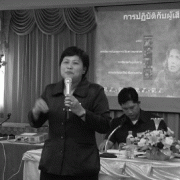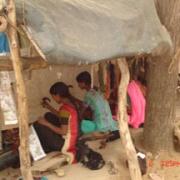Advancing Access to Education for Refugees
Summary Available
As more people throughout the world are forced to leave their homes due to conflict, climate change, or in search of a better life, host nations are trying to keep up with the influx of new students in their education systems. With scarce resources and limited funds, governments and organizations are forced to come up with new ways of including refugee students in local schools. With increasing xenophobia and gaps in integration policies, integrating these new students is not without its barriers. Language restrictions, finances, and lack of job opportunities are just a few of the obstacle keeping kids out of school. Furthermore, displacement and resettlement can leave children out of school for years at a time, making it difficult for them to rejoin formal education. Conversation participants discuss the issues with refugee inclusion in national education systems and draw on real-world programs as potential solutions to some of the challenges that refugees face in obtaining an education.


 Forum Asia worked with the Royal Thai Police to promote community-oriented and human rights friendly policing in Thailand and other countries in Asia. They utilized the introduction of a unique, computer based police training education program to engage and enlist the support of key leadership of the Royal Thai Police to champion the training tool. The computer-based police training program was a valuable tactic within their strategy serving to build mutual trust, acknowledgement and support while also helping police to more effectively address their immediate day-to-day policing challenges making the police better aware of human rights as well as more professional.
Forum Asia worked with the Royal Thai Police to promote community-oriented and human rights friendly policing in Thailand and other countries in Asia. They utilized the introduction of a unique, computer based police training education program to engage and enlist the support of key leadership of the Royal Thai Police to champion the training tool. The computer-based police training program was a valuable tactic within their strategy serving to build mutual trust, acknowledgement and support while also helping police to more effectively address their immediate day-to-day policing challenges making the police better aware of human rights as well as more professional. The Center for Victims of Torture (CVT) has instituted an intensive training and supervision model for refugees to develop local capacity for providing understanding and skills for mental health support to rebuild communities after massive human rights atrocities. CVT has instituted the training model in refugee camps in Guinea and Sierra Leone for refugees from Sierra Leone and Liberia. The model combines intensive, hands-on training of refugees with ongoing supervision.
The Center for Victims of Torture (CVT) has instituted an intensive training and supervision model for refugees to develop local capacity for providing understanding and skills for mental health support to rebuild communities after massive human rights atrocities. CVT has instituted the training model in refugee camps in Guinea and Sierra Leone for refugees from Sierra Leone and Liberia. The model combines intensive, hands-on training of refugees with ongoing supervision.  Bachpan Bachao Andolan (Save the Childhood Foundation) in India developed the concept and application of child friendly villages as a way to not only promote education for all but also combat the cycle of child labor. Child labor is both a cause as well as a consequence of poverty, illiteracy and lack of human security. The aim of child friendly villages is to create and sustain a child friendly atmosphere within the community to ensure education and put an end to child labor.
Bachpan Bachao Andolan (Save the Childhood Foundation) in India developed the concept and application of child friendly villages as a way to not only promote education for all but also combat the cycle of child labor. Child labor is both a cause as well as a consequence of poverty, illiteracy and lack of human security. The aim of child friendly villages is to create and sustain a child friendly atmosphere within the community to ensure education and put an end to child labor.